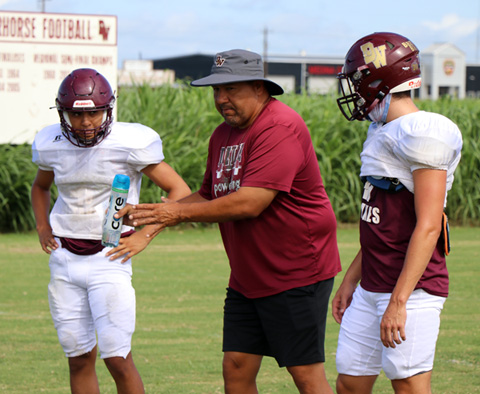Jerel Beaty
Staff Writer
In this day and time with the University Interscholastic League loosening many decades-long restrictions on what coaches are actually allowed to do and what they can teach their players in the offseason and throughout the summer, there are little excuses a high school student-athlete can legitimately make if they choose to report to two-a-day training and practices “out of shape” as it relates to the rigors of the strength and conditioning for their particular sport whether it be football, volleyball, Cross Country, tennis, or whatever the case may be.
It is a well-known fact the coaches in Devine, Lytle, and Natalia dedicate most of their summertime to coaching, teaching, and training players from all sports from their respective school.
Not taking advantage of training such as this for high school and middle school athletes more than likely puts them behind others that deeply committed to proper offseason preparation.
But why is this important to student-athletes if the season typically “starts” the first Monday in August? Don’t they all begin on a level playing field? Um. No!
Reporting out of shape or unable to lift more weight than the last day of the previous school year is very noticeable among coaches. All coaches love players who commit to becoming overall better players, which includes their offseason focus and diligence.
Training and maintaining a healthy, proper diet are crucial and allows the opportunity for athletes to build strength, improve skills, and enhance overall fitness without the immediate pressure of competition the foundation for peak performance and reduces the risk of injuries once actual season-training begins.
In what is typical of offseason training programs is the ability to focus on specific areas of improvement such as building muscle strength, increasing endurance, and enhancing agility. This is also a time to refine technical skills and correct any weaknesses that might have been evident in previous seasons.
Focusing this way allows athletes to return to competition more prepared and confident in their abilities.
An athlete’s healthy diet is rich in lean proteins, whole grains, and fruits and vegetables along with staying hydrated is equally important. Proper nutrition provides the necessary energy for training and recovery, supports muscle growth and repair, and helps maintain a healthy weight while maintaining dehydration can significantly impact performance and recovery.
A majority of the time, if a player “crashes” during a workout it is not attributed to what the athlete did that morning or afternoon during practice, but attributed to what the athlete did or did not do the night before as far as refueling and rehydrating their bodies.
It is never too late to start a healthy, beneficial plan. Yes, most practices begin August 5 so the time to begin is right now.
Eat nutritiously. Hydrate responsibly. Exercise with a purpose.
Give your body and yourself the best chance possible to be successful and to remain healthy!
